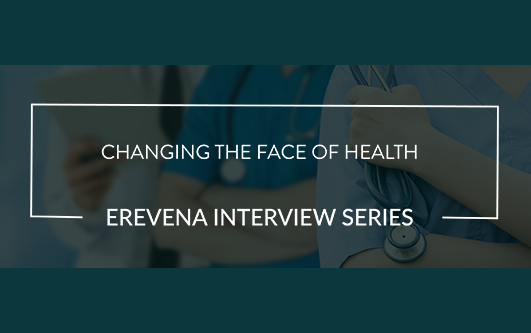Joe Rinaldi Johnson, Chief Product Officer at Zava, the leading online doctor service in Europe, talks to Jonathan Bryant, Partner at Erevena and explains why the impact of Covid-19 is game changing for the healthcare sector in terms of how patients are choosing to access routine healthcare services – and why there’s no turning back.
Can you provide us with some background on Zava and its founders?
Zava was established 9 years ago by David Meinertz and Amit Khutti. As the company’s CEO, David is happy to talk about the rationale behind the business, which stemmed from his own long-term health condition. Fed up with the time and inconvenience of having to make appointments, take time off work and sit in waiting rooms just to get a repeat prescription, he knew there was a better way to access routine healthcare. The seed for Zava – or as it was known at launch, DrEd – was sown.
David and fellow entrepreneur Amit’s premise was simple. They set out to build a business providing accessible, dependable healthcare for the routine things that people typically visited their GP for. Central to their business model from the outset was patient interaction with qualified GPs using both online and telephone channels.
What did Zava do that was different?
We took the typical interaction between patient and GP and converted this into a medical questionnaire. So, all the Q&As that are part of a face-face doctor’s appointment were embedded in a standardised medical form, for which we created digital tools that GPs could use. By measuring the number of consultations Zava’s in-house doctors and clinicians could do per day using this questionnaire compared with NHS GPs, we have calculated that this model is 20 times more efficient than that experienced in primary NHS care.
Can you expand on this medical form?
Put simply, the magic is in the form. The tooling we created for GPs uses smart logic so that they are immediately alerted if there is a problem with the prescription or other patient request. All the relevant medical history is captured through the form and builds up a medical record for the doctors. It’s an interface that Zava has carefully developed over the years. Our team of in-house doctors has played an active role in the logic trees, continually looking at clinical guidelines and workflows. And while the technology provides the analytics and relevant outputs, it is always the doctor or clinician who makes the decision, which is an important differentiator.
How did Zava scale?
Having calculated the time saving and cost benefit that a service like this could offer to national healthcare providers, in the early days we approached the NHS and German statutory insurers. But the public sector wasn’t ready for a digitalised medical service like this. It simply wasn’t on the agenda at the time. So, we moved to the private sector and have seen amazing success, including building a partnership with Superdrug, which was a great step. Then we spent a few years scaling the business, taking a prudent approach to our spending, rather than burning cash. Three years ago, we hit profitability. We’re backed by Angel investors and HPE Growth, which has enabled us to expand our operations into Germany and France. Three years ago, we hit profitability. We now employ about 200 people, including engineers, product and design specialists and, of course, our medical specialists. What we’ve discovered is that once you get top talent on board, others want to follow suit. People are always keen to join us as they are excited by what we are doing.
Tell us more about the partnerships with Superdrug and others
With Superdrug, we have white labelled our go-to-market model in two services: Superdrug Online Doctor and Superdrug Health Clinics. The Superdrug Online Doctor provides the same consulting, testing and medicine services as our own-branded Zava offering. We have also established partnerships with a large online German pharmacy – Shop Apotheke – and a pharmacy association – Noventi Health in Germany.
What is your revenue model?
Customers (patients) pay a one-off fee each time they use our services. We are also looking into how we can be part of statutory systems, for example national reimbursement systems. We’ve just launched a video consultation service in Germany that is integrated with the state reimbursement system. This will broaden our customer base from its current volume of over 1 million treatments a year. The need for patients to stay at home during the current Covid-19 pandemic makes this video service and reimbursement model a hugely relevant proposition at this moment in time.
Can you expand on the impact of Covid-19?
From the perspective of our own workforce, we were well prepared for the lockdown and had everything set up for remote working in a week. Everyone has done an incredible job at adapting to home-based working. Only the physical movement of products (dispensing and test kits) cannot be done from home. At a business level, the pandemic has created huge additional demand for our services. Regulations in the healthcare industry are complex and multi-layered, varying by country. Almost overnight, we saw a shift in the regulatory landscape as Covid-19 changed the playing field. Customers have quickly discovered the convenience and health benefit of consultation without physical contact. This will be game-changing for the industry and I can’t see the market going back to the way it was before Covid-19.
Besides the new video consultations in Germany, what other new services are on the cards?
We have just launched a testing kit that is sorely needed in the current Covid-19 pandemic. We’ve been working with a private testing laboratory for years and have quickly adapted the product to test for Covid-19, with the lab able to conduct 2,000 tests a day.
We also have some interesting work going on around patient pathways, whereby we help patients to make informed choices using the information they provide us with on the online Q&A form. We’re designing some new customer journeys based on logic trees. Ultimately, though, the final decision will still rest with the qualified doctor.
We are always looking at ways to improve or expand what we offer, while keeping our business aligned wholly with customer intent. Our core model is built around a number of key services for which patients don’t need or would rather not have a face-to-face consultation. Our new video service has expanded this to provide a complete GP offering, covering hundreds of conditions. We have had to build a blend of technologies to enable this and we are excited at the prospect of expanding with it in Germany.
We continue to grow our business in the UK, Ireland, Germany and France. While further international expansion might be on the cards in the future, for the short term at least, we have plenty to focus on in these markets.
Share this article:












